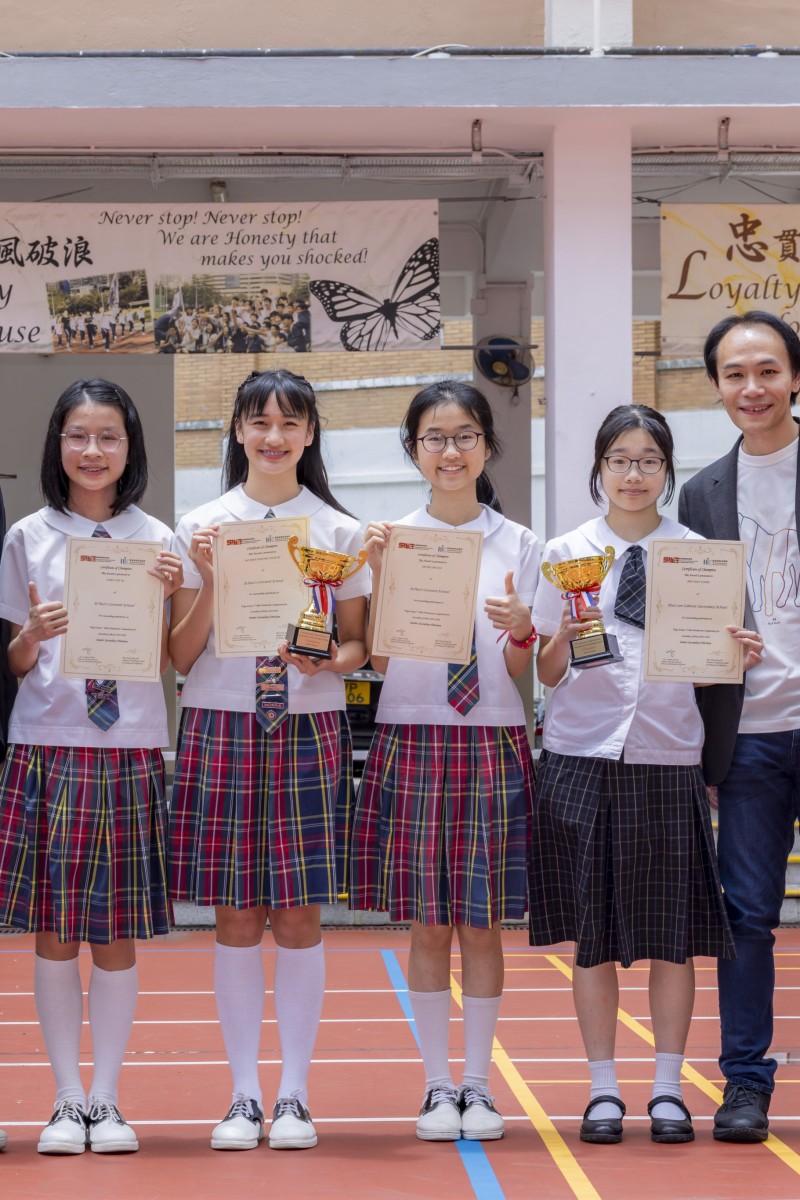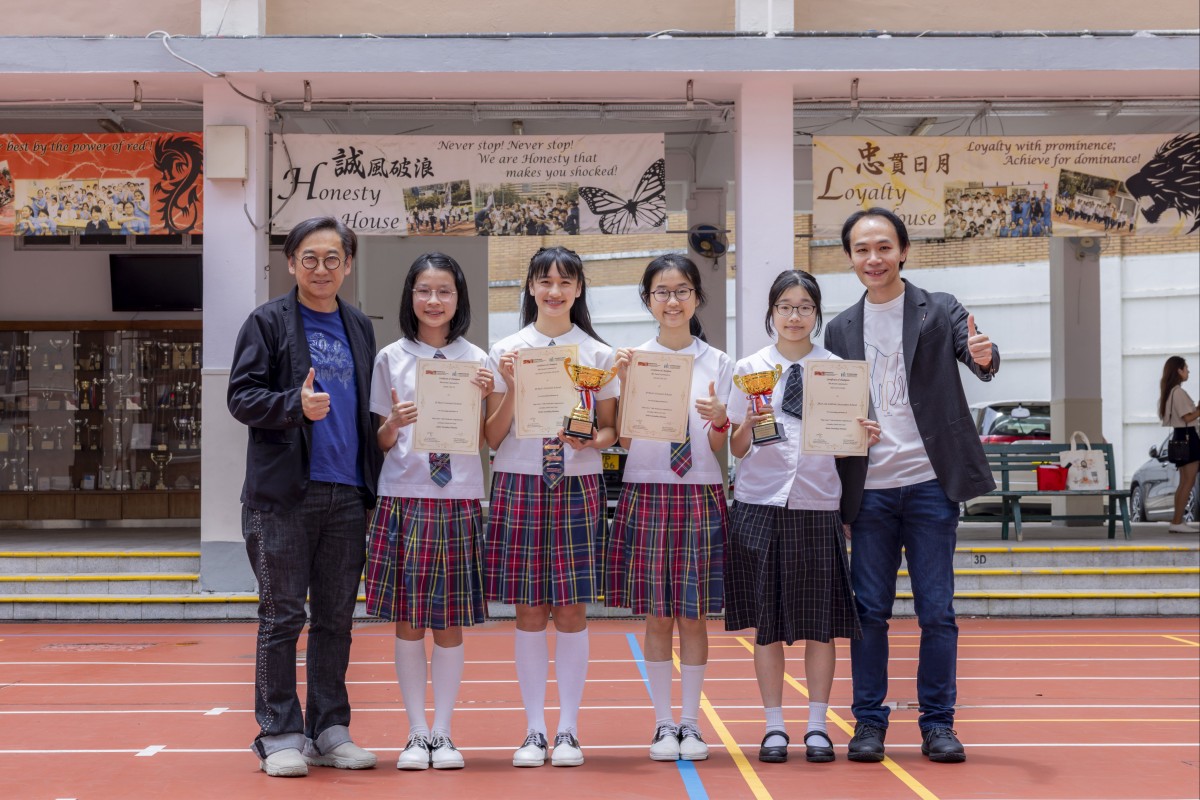
Students explore advanced science experiments and hone diverse skills by participating in the Digi-Science Video Production Competition
This year’s competition encouraged students to use testing to validate the sustainability of various items used in our daily lives.
 Dr Leslie Lam (left) and Robert Lui (right) served as judges and presented awards to the winning teams on behalf of the Council. Photo: Handout
Dr Leslie Lam (left) and Robert Lui (right) served as judges and presented awards to the winning teams on behalf of the Council. Photo: Handout
To encourage students to incorporate testing into their science experiments and arouse their interest in testing and certification, the Hong Kong Council for Testing and Certification (HKCTC) has co-organised the Digi-Science Video Production Competition with the Hong Kong Association for Science and Mathematics Education (HKASME) since 2016.
This year’s theme, “Sustainability in Daily Life,” prompted participating student teams to explore diverse scientific topics highly relevant to our everyday existence. They developed hypotheses, designed experiments, and employed tests and other methods to verify their theories. Each team was required to illustrate their experiment process and conclusion in a two-minute video, enhancing their communication and organisation skills.
Four HKCTC members, Gilly Wong, Dr Lesley Lam, Dr Fanny Tang and Robert Lui, joined the judges from HKASME to assess the entries. They expressed amazement at the students’ ability to delve into advanced scientific topics. Dr Lam noted, “The videos showcased their dedication to researching topics and conducting literature reviews. Furthermore, the students meticulously followed procedures, from formulating hypotheses and conducting investigations to validating their theories. The competition encouraged students to cultivate this rigorous approach and logical thinking, extending beyond mere problem-solving. It also deepened their understanding on the importance of testing.”
Lui praised the students’ presentation and editing skills. “They excelled at conveying complex experiments through concise two-minute videos that are both informative and accessible to laypeople,” he said. “Many videos even incorporated music and comedic elements, making them truly captivating.”
Senior Secondary Division Champion: Shun Lee Catholic Secondary School
Title of video: Red Dye Makes You Die
Team members: So Cheuk-hang, Feng Yuk-wa, and Pak Yuet-ching
Food safety is essential for sustainability. The team researched tests for food safety and identified the Marquis Test and the Biuret Test as effective methods for detecting Rhodamine B. This carcinogenic substance can cause food poisoning if ingested in large quantities.
“These two experiments are qualitative tests which aimed to identify specific components (functional groups of the molecule) within the samples using these tests. For instance, the Marquis Test detects alkaloids, while the Biuret Test detects amine groups. Based on this, we inferred the possible presence of Rhodamine B in the samples and proceeded to conduct quantitative tests to determine the exact concentration,” the team members noted.
During the tests, the team encountered difficulties obtaining clean results, leading them to explore alternatives. Through trial and error, they eventually identified samples and experiments that produced substantial results. “Patience and caution were indispensable in testing,” they said.
The judges were impressed by the use of comedy in their video. “We incorporated popular memes from social media to capture the interest of young viewers,” the team said. “Our humorous approach aimed to engage the audience and draw their attention to the potential hazard of Rhodamine B and other food safety issues.”
Junior Secondary Division Champion: St Paul’s Convent School
Title of video: HydroPreserve+
Team members: Chan Yin-yu, Jocelyn Ho Man-sheung and Keung Yat-kiu
Driven by their commitment to sustainability, the team embarked on a project to address water conservation during planting. Being passionate about organic farming, they explored ways to produce hydrogel that optimises water retention for plants. Originally, the team chose agar as the basic ingredient, but after numerous tests, they found that it did not meet their expectations.
“We made reference to other similar precedent studies and identified sodium alginate as the key ingredient for our hydrogel. Extracted from algae, sodium alginate is natural, non-neurotoxic, non-carcinogenic and biodegradable, which is an ideal sustainable solution.”
The team repeatedly tested and measured the absorbency of sodium alginate hydrogel. To replicate a natural environment to enhance the viability of the result, they buried the samples in the soil collected from the garden for seven days and conducted daily measurements down to two decimal places at the exact same time to observe changes. Meanwhile, the team maintained a control sample for comparison.
By skilfully editing their video, the team gave a lively presentation. Filming on location outside the school lab enriched the visual elements and captivated the audience. The project served as an excellent training that fostered the right attitude toward testing and experiments. “Despite various challenges, our passion sustained the experiments, and through trial and error, we achieved our goal, proving that sodium alginate hydrogel is perfect for sustainable planting,” the team said.
